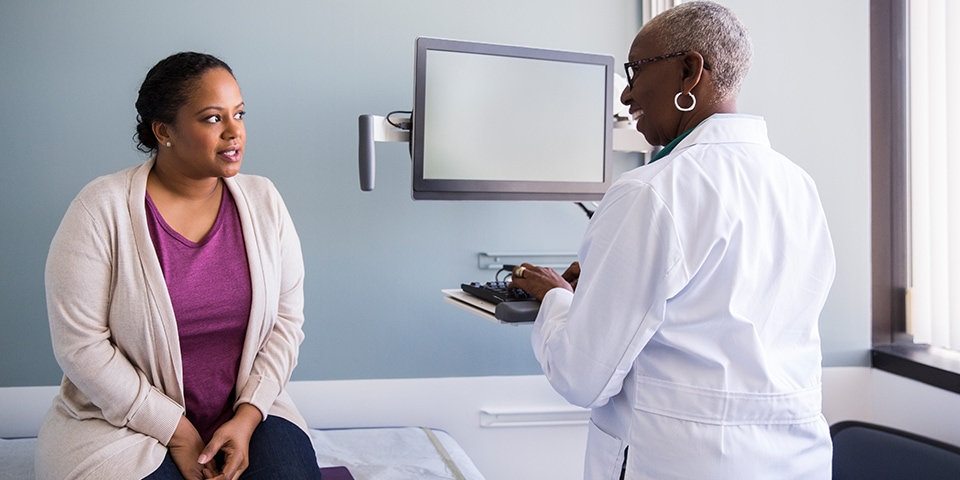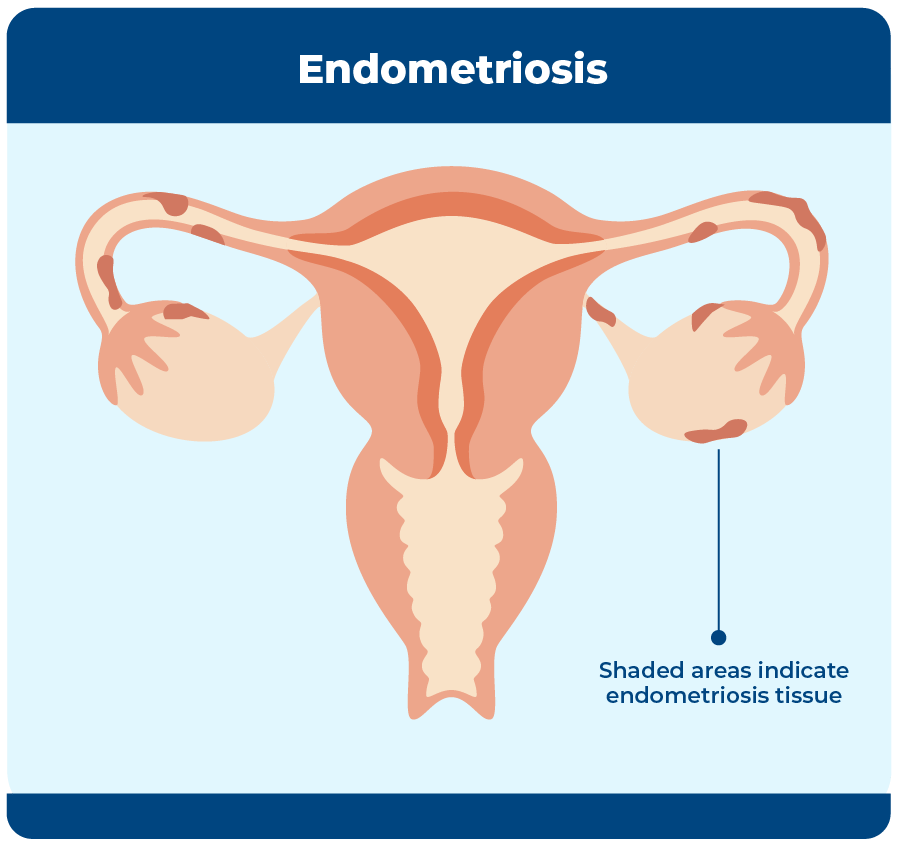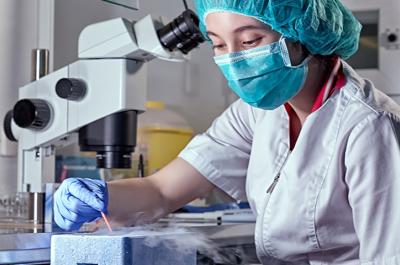Does endometriosis cause infertility?

Endometriosis occurs when the tissue that lines the uterus grows outside the uterus. It is a common condition that can cause painful, heavy periods. While some women who have endometriosis don’t experience any symptoms, others struggle with issues resulting from endometriosis for years.
Most people equate endometriosis to heavy periods, but this condition can sometimes cause other problems as well. Maybe you’re constantly having to wear panty liners due to spotting between periods. Maybe you deal with digestive issues every month, particularly during your period (which feels doubly unfair). Maybe you experience pelvic pain during sex, which not only can make the experience unenjoyable, but also might affect your relationships.
It’s OK to feel frustrated and upset by this condition. And you are certainly not alone. According to the Office on Women’s Health, it’s estimated that endometriosis may affect 11% of US women.1
As women reach their reproductive years, many wonder, Does endometriosis cause infertility? Sometimes. Here we take a look at why, as well as the symptoms and some treatment options for endometriosis. If you have any questions, or if you’re experiencing symptoms, make sure to contact your healthcare provider.
What is endometriosis?
Endometriosis occurs when the tissue that lines the uterus grows outside the uterus. Endometriosis typically affects the ovaries, fallopian tubes, the membrane that lines your abdominal cavity, and the outer surfaces of your uterus, bladder, intestines and rectum.2

Why can endometriosis cause infertility?
Endometriosis tissues react in the same way as those in the uterus, thickening and then breaking down and bleeding with each menstrual cycle.2 But because it’s not where it’s supposed to be (i.e., inside the uterus), it doesn’t exit the body like endometrial tissue does. Instead, scarring, inflammation and irritation can occur. Adhesions can form. And the tissue can obstruct the fallopian tubes, preventing fertilization.2
According to the American College of Obstetricians and Gynecologists (ACOG) almost four in 10 women with infertilityhave endometriosis.2
What are endometriosis symptoms?
Some women don’t experience any symptoms and only discover they have endometriosis after they struggle to get pregnant.2 But many women do experience symptoms. These include:
- Chronic pelvic pain, especially right before or during your period2
- Painful (sometimes very painful) menstrual cramps2
- Pelvic pain during sex 1,2
- Heavy periods
- Pain while pooping (if the tissue is growing on your bowels)1,2
- Pain while peeing (if the tissue is growing on your bladder)1,2
- Bleeding or spotting between periods1
- Digestive problems, especially during your period1
- Not being able to get pregnant1,2
How do I know if I have endometriosis?
According to the Endometriosis Foundation of America, endometriosis typically affects women in their reproductive years. On average, there is a seven- to 10-year delay in diagnosis.3 If you have any of the above symptoms, it’s important to talk to your healthcare provider right away. It may be helpful to track your symptoms for several months to better describe what issues you’re experiencing and when. While an ob-gyn may do a pelvic exam,1,2 ultrasound1 or MRI,1 the only way to know for sure if you have endometriosis is by having laparoscopic surgery.1,2 Sometimes a biopsy of the tissue may be performed as well.1,2 Don’t be afraid to ask questions or seek a second opinion. You are your best gynecological and reproductive health advocate.
What endometriosis treatment options can help improve fertility?
Endometriosis can be treated by medication or by removing the extra tissue (through surgery). When considering treatment options, talk to your ob-gyn about your fertility plans. If you’re not trying to get pregnant, hormonal birth control can sometimes relieve symptoms if they’re not severe.1 According to ACOG, while hormonal medications can help slow the growth of endometrial tissue and may help new tissue from forming, they often don’t reduce the amount of tissue present.2
If your pain is severe or you’re having fertility issues, removing endometriosis via surgery may be an option to discuss further with your healthcare provider.1,2
What about IVF and endometriosis?
Only you and your healthcare provider or fertility specialist can decide what treatments are best to try as you navigate trying to conceive with endometriosis. In vitro fertilization (IVF) may be a good option for some women; the success rate can depend on what stage of endometriosis you have. One study showed that stage III or IV endometriosis meant a worse IVF prognosis compared to a milder stage.4(Stage I and II endometriosis is considered milder, with fewer implants and without the presence of cysts and adhesions.)
If all this sounds overwhelming, just remember: You are not alone. Many women who have endometriosis go on to have healthy pregnancies. If your healthcare provider has diagnosed you with endometriosis and you’re trying to get pregnant, talk openly with your ob-gyn to ensure you’re being as proactive as possible as you proceed.
Sources
- “Endometriosis,” (February 2021), The American College of Obstetricians and Gynecologists, https://www.acog.org/womens-health/faqs/endometriosis
- “Endometriosis,” (April 1, 2019), The Office on Women’s Health, U.S. Department of Health and Human Services, https://www.womenshealth.gov/a-z-topics/endometriosis
- “Endometriosis: Fast Facts,” (July 22, 2010), Endometriosis Foundation of America, https://www.endofound.org/faq
- Kuivasaari, P., Hippeläinen, M., Anttila, M., Heinonen, S., (November 2005), “Effect of endometriosis on IVF/ICSI outcome: stage III/IV endometriosis worsens cumulative pregnancy and live-born rates,” Human Reproduction, 20(11), 3130–3135, https://doi.org/10.1093/humrep/dei176
- “Endometriosis Stages: Understanding the Different Stages of Endometriosis,” (n.d.), Endometriosis Foundation of America https://www.endofound.org/stages-of-endometriosis




